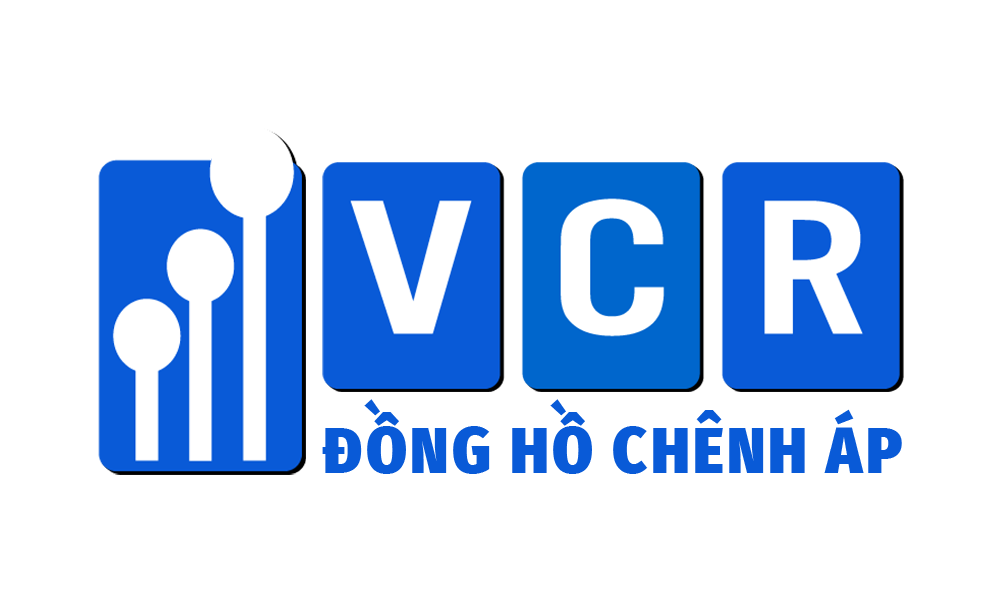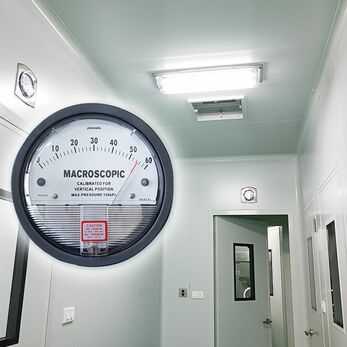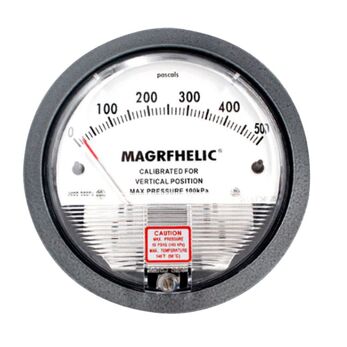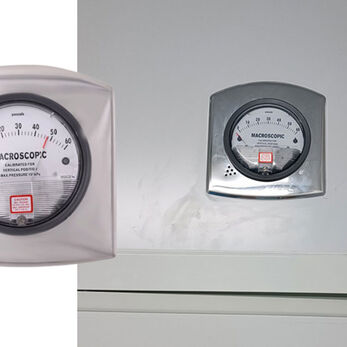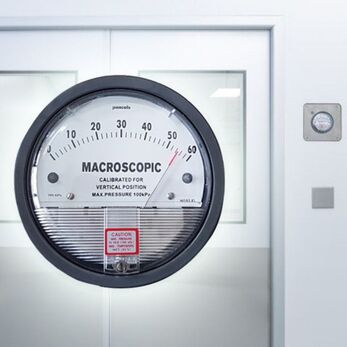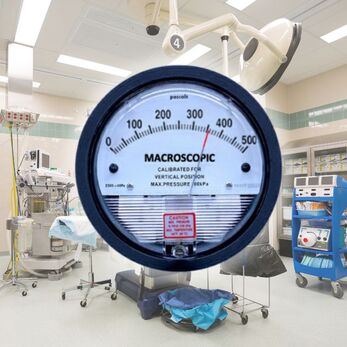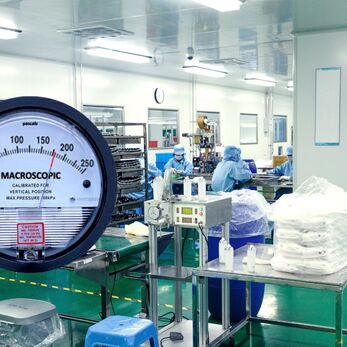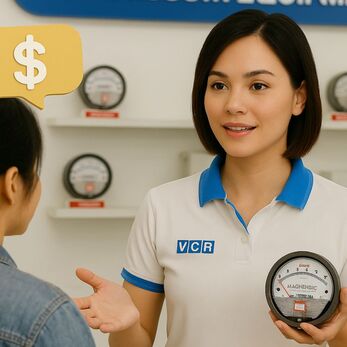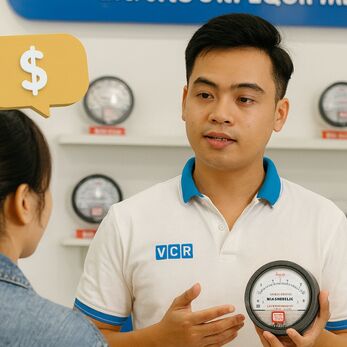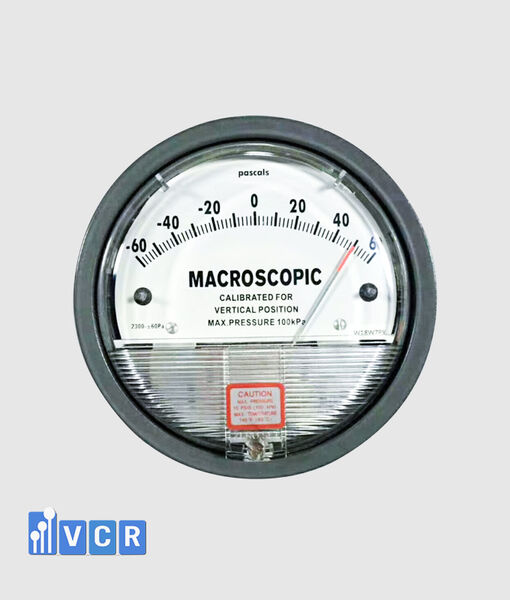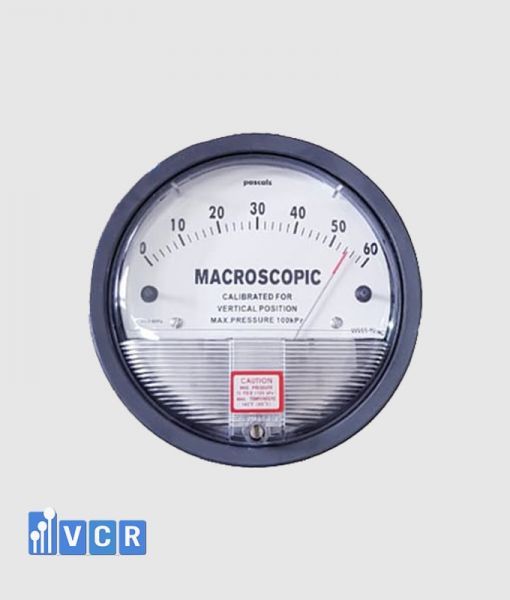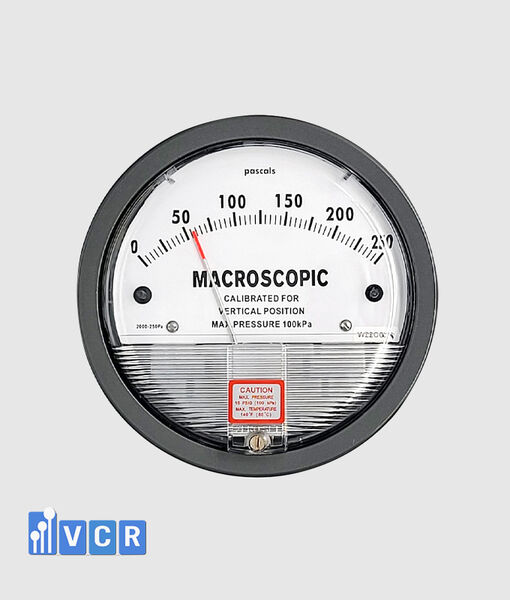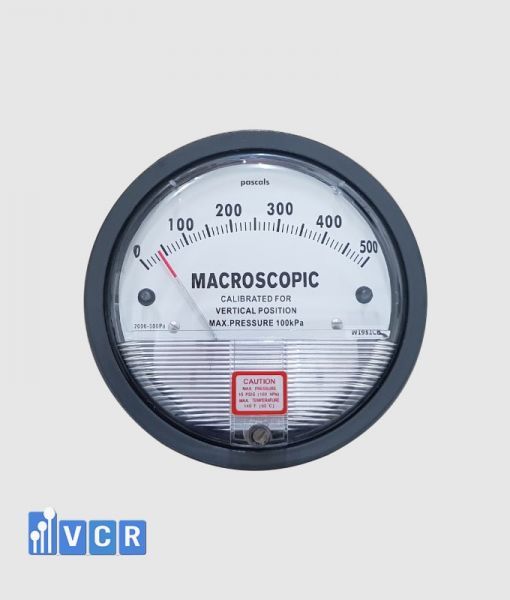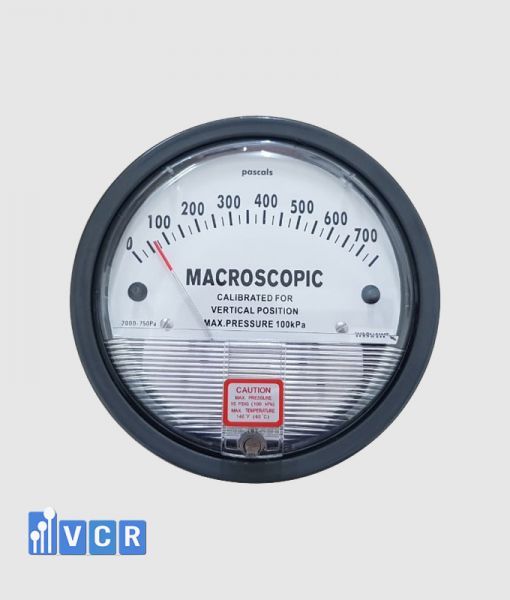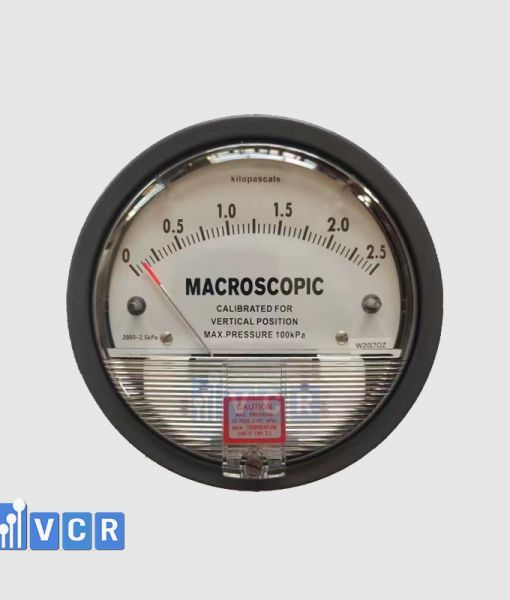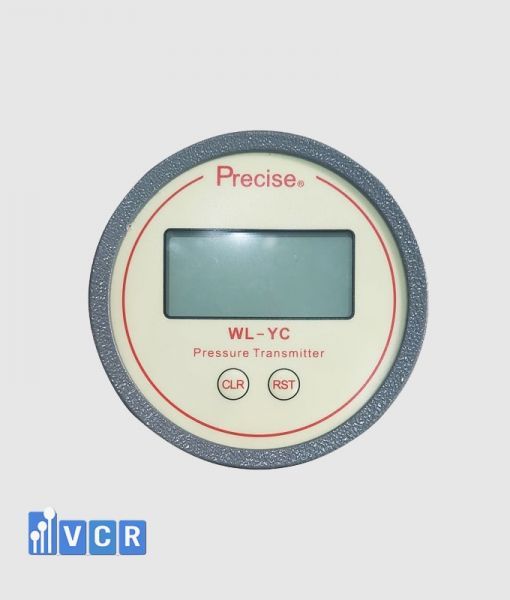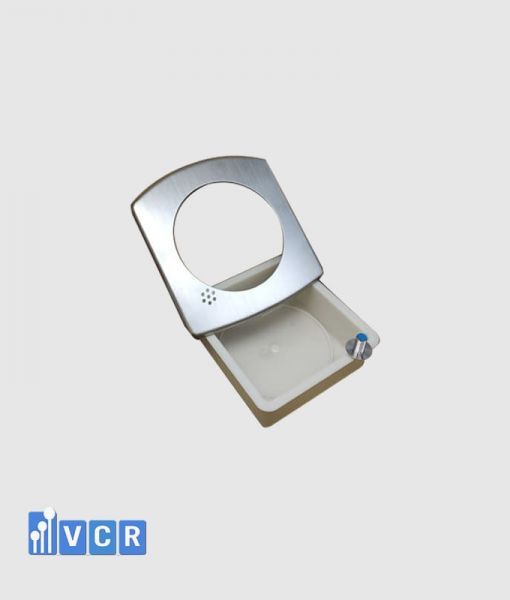Differential pressure gauges are indispensable equipment in food factories, helping to monitor and control pressure between production areas, maintain proper airflow and prevent cross-contamination. The latest price list below will help you choose the right differential pressure gauge, meet HACCP, ISO 14644 standards.
- 1. Overview of Differential Pressure Gauges in Food Processing Plants
- 2. Factors Affecting the Price of Differential Pressure Gauges
- 3. Latest Price List for Differential Pressure Gauges
- 4. Recommendations for Choosing the Right Gauge
- 5. VCR Warranty & After-Sales Policy
- 6. FAQ
- 7. Contact for Pricing & Solutions
1. Overview of Differential Pressure Gauges in Food Processing Plants
A differential pressure gauge is an essential device that helps food processing plants control pressure differences between production areas, ensuring airflow moves in the correct direction, preventing cross-contamination, and meeting hygiene and safety standards such as HACCP and ISO 14644.
1.1. Role in Environmental Control in Production
- Maintaining stable cleanroom pressure: Gauges help monitor positive or negative pressure between rooms, preventing contaminated air from entering production areas.
- Preventing cross-contamination: In food factories—especially in processing and packaging areas—maintaining correct differential pressure helps limit the movement of bacteria, dust, and moisture from dirty to clean zones.
- Supporting quality control: Data from the gauge assists QA/QC in evaluating production conditions to ensure products meet food safety standards.
- Alerting in case of incidents: Some electronic/digital gauges integrate alarms when pressure exceeds the permissible threshold.

1.2. Importance of Maintaining Differential Pressure per HACCP & ISO 14644
- HACCP (Hazard Analysis and Critical Control Points): Requires food plants to control physical, chemical, and microbiological contamination. Differential pressure is considered a Critical Control Point (CCP) in production.
- ISO 14644: An international cleanroom standard that specifies minimum pressure differences between cleanliness classes to ensure clean air always flows from cleaner to less clean areas.
- Dual-standard compliance: Maintaining pressure differences ensures both legal compliance and brand credibility when exporting to demanding markets (EU, Japan, USA).
1.3. Practical Use Cases
- Processing – Packaging areas: Maintain positive pressure relative to corridors to prevent contaminated air infiltration.
- Cold storage – Preservation rooms: Monitor pressure to avoid temperature-humidity differences causing condensation or mold.
- Airlocks and changing rooms: Control airflow direction when workers enter/exit production zones.
- Areas producing strong odors: Use negative pressure with air filtration to prevent odor spread.
2. Factors Affecting the Price of Differential Pressure Gauges
The price of differential pressure gauges in food plants depends on the device type (mechanical, electronic, digital), measurement range & accuracy, construction materials, brand & origin, and accompanying standards/certifications. Each factor directly impacts investment cost and product lifespan.
2.1. Classification by Operating Principle
Mechanical type (diaphragm, membrane, spring)
- Principle: Uses diaphragm/spring deformation from pressure difference to display readings.
- Pros: Low cost, durable, no power supply needed.
- Cons: No data logging, lower accuracy than electronic.
Electronic type
- Principle: Pressure sensor converts signals into numerical values on LED/LCD.
- Pros: High accuracy, can integrate alarms, connect to monitoring systems.
- Cons: More expensive than mechanical, requires power or batteries.
Advanced digital type
- Principle: Electronic sensors with microprocessors display, store, and transmit data via Modbus/Ethernet.
- Pros: Remote data access, trend analysis support.
- Cons: Highest cost, requires regular maintenance.
2.2. Classification by Range & Accuracy
- Low pressure range for cleanrooms: Typically 0–60 Pa or 0–250 Pa, suitable for ISO 14644-compliant zones.
- Medium–high pressure range: Several hundred Pa to several kPa, used in cold rooms, storage, industrial HVAC.
- Permissible error and price impact: ±1% is sufficient for standard food cleanrooms. ±0.5% or ±0.25% for high-spec rooms increases price by 20–40%.

2.3. Construction Materials
- Stainless steel (304, 316L): Corrosion-resistant, ideal for humid/chemical environments. 316L offers better resistance, 15–25% more expensive.
- ABS/Polycarbonate: Lightweight, cheaper than stainless, suitable for dry, low-chemical areas.
- Special materials: Anti-corrosion alloys or anti-fouling coatings for seafood or fermentation areas.
2.4. Brand & Origin
- Japan, Europe, USA: High durability, stable accuracy, strong after-sales service. 20–50% more expensive.
- Taiwan, China: Low cost, wide range, but durability and accuracy may vary without a reputable supplier.
- Brand impact: Reputable brands often provide calibration services and long-term warranties, lowering maintenance costs.
2.5. Standards & Certifications
- HACCP, ISO 14644, GMP EU/WHO: Ensures compliance with hygiene and environmental requirements.
- Calibration certificates: Required for audits; may raise price by 5–10% but reduce inspection risks.
See more: Demystifying Differential Pressure Gauges in Dispensing Booths
3. Latest Price List for Differential Pressure Gauges
Quick summary:
Prices range from 900,000 VND for basic mechanical types to 8,000,000+ VND for advanced digital types. Cost depends on type, brand, features, and certifications.
3.1. Price by Type
|
Type |
Price Range (VND) |
Key Features |
|
Mechanical |
900,000 – 2,500,000 |
Durable, low-cost, no power, moderate accuracy |
|
Electronic |
2,800,000 – 5,500,000 |
High accuracy, alarms, needs power/battery |
|
Advanced Digital |
5,800,000 – 8,500,000+ |
Data logging, Modbus/Ethernet, remote monitoring |
3.2. Price by Brand
|
Brand & Origin |
Price Range (VND) |
Features |
|
Dwyer – USA |
3,500,000 – 8,500,000 |
High quality, global standards, long warranty |
|
Fuji – Japan |
3,200,000 – 7,800,000 |
Durable, compact, corrosion-resistant |
|
Delta Controls – Taiwan |
1,800,000 – 4,500,000 |
Good value, stable quality |
|
OEM China |
900,000 – 3,200,000 |
Low price, diverse models, choose reputable supplier |
3.3. Feature–Price Comparison
|
Criteria |
Mechanical |
Electronic |
Digital |
|
Price |
900k–2.5M |
2.8–5.5M |
5.8–8.5M+ |
|
Accuracy |
±1–2% |
±0.5–1% |
±0.25–0.5% |
|
Alarm |
No |
Yes (sound/light) |
Yes (sound/light/network) |
|
Data connection |
No |
Limited (analog) |
Yes (Modbus/Ethernet/WiFi) |
|
Best for |
Low-variation zones |
Key zones needing continuous monitoring |
Automated plants, export compliance |
Note: Prices are indicative. VCR offers tailored quotes with installation & calibration services.
4. Recommendations for Choosing the Right Gauge
When choosing a gauge for food plants, consider technical needs, environment, automation level, and budget. Mechanical is best for basic needs; electronic/digital for continuous monitoring and data storage.
4.1. Selection Criteria
- Accuracy requirements
- Environment (humidity/chemical exposure)
- Budget tiers: under 3M, 3–6M, over 6M VND

4.2. When to Choose Mechanical
- Low-cost, durable, no power needed
- For stable-pressure zones, no data logging required
4.3. When to Choose Electronic/Digital
- High accuracy, alarms, data storage
- For ISO 7–8 cleanrooms, automated systems, export compliance
See more: Workings of Differential Pressure Gauges A Guide to Function, Calibration, and Maintenance
5. VCR Warranty & After-Sales Policy
- Standard: 12 - 24 months depending on product line and brand.
- Conditions of application:
Equipment supplied and installed by VCR
Use for the correct purpose and according to the manufacturer's instructions
- Renewal support: Exchange new products within 7 days if there is a technical error from the manufacturer.

- Remote support: Operation consultation and troubleshooting via phone, email, video call.
- On-site support: VCR technicians are available within 24-48 hours at major production areas nationwide.
- Periodic calibration: Providing calibration services according to HACCP & ISO 14644 standards, with certificates.
- Providing genuine accessories and spare parts throughout the product life cycle.
- Free training for operators upon new installation.
- Regular maintenance reminders via email/SMS to ensure stable operation of the equipment.
- Preferential policies for customers who re-purchase or upgrade equipment.
6. FAQ

7. Contact for Pricing & Solutions
Get a free quote and technical advice for the right differential pressure gauge for your food plant.
Hotline: 090.123.9008
Email: [email protected]
Website: https://donghochenhap.com/
Diep VCR


